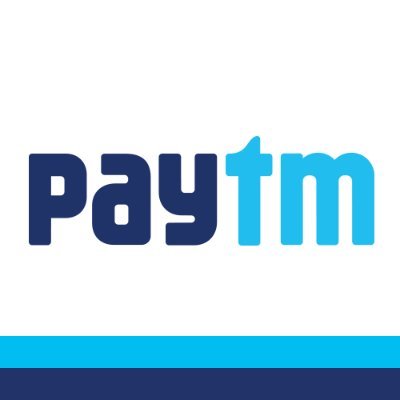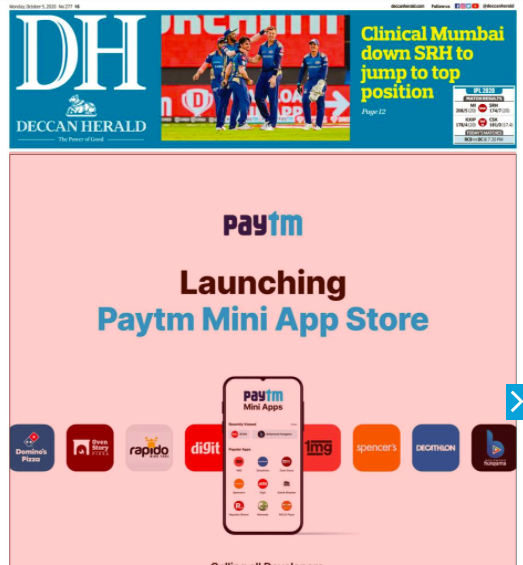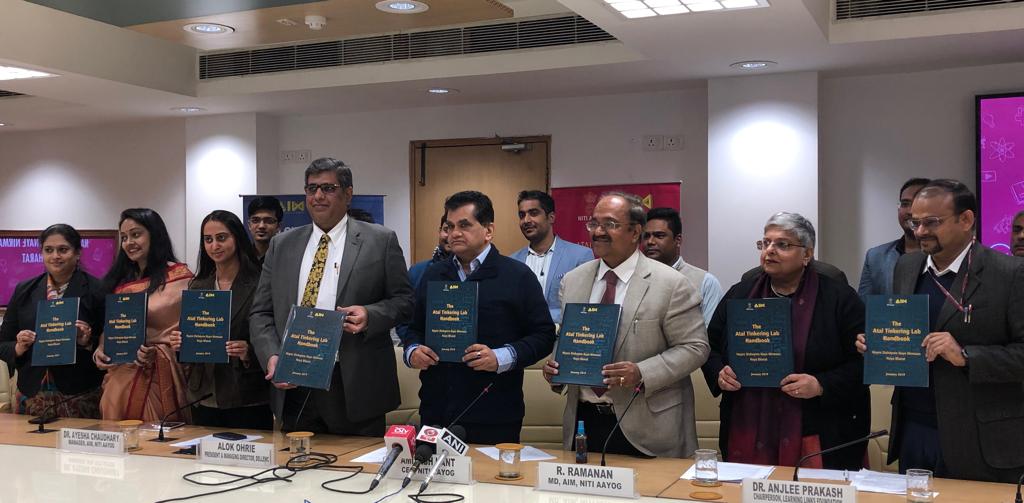Hawkish behaviour of leading global tech giant fuels counter-strategy
BENGALURU: Indian startup founders including Vijay Shekhar Sharma, Sachin Bansal, Bhavish Aggarwal and Maheshlinga Reddy have discussed game plan against global tech giants capital dumping and muscle-flexing during the first half of this decade. The decision of Paytm to launch a mini-app store to support Indian developers, in a direct challenge to Google’s dominance in the space, is yet another validation of that strategy?
Paytm is providing listing and distribution of these mini apps from within its app, without any charge. Developers will be able to give a choice of Paytm Wallet, Paytm Payments Bank, UPI, net banking, and card payments to users. Mini apps are custom-built mobile websites that give users an app-like experience without requiring an actual download — which will benefit millions of users by helping them save their data and memory.
It is interesting that the launch of the store follows the payment app being temporarily removed from Google Store on 18 September for violating developer guidelines on real-money gaming. But Paytm app got reinstalled as the company came up with its version.
“It comes with a developer dashboard for analytics and payment collection, along with various marketing tools to engage with users. This app store has been running in beta with select users and has witnessed over 12 million visits in September,” the company said in a statement on Sunday.
“Paytm Mini App Store empowers our young Indian developers to leverage our reach and payments to build new innovative services. For Paytm users, it will be a seamless experience that doesn’t require separate downloads and enables them to use their preferred payment option,” said Vijay Shekhar Sharma, co-founder and chief executive officer of Paytm.
Paytm announced the launch of its Appstore via print ad across India.
Paytm’s move to start a mini-app store is primarily because of the aftereffect of Google earlier decision. In addition to that, the Indian payment giant is also fuming on Google decision to instruct developers listed on its Play Store to avail its billing service. Paytm is unhappy over Google’s decision to impose a 30% commission on any transaction made for a digital product or service through its in-app billing system.
Tech rivalry
The direct contest with Google heralds another disruptive moment in the journey of Paytm.
Paytm stated its mini-app store will help developers take their products to the masses, and is providing listing and distribution of these mini-apps within its app. This move also comes in the backdrop of its rival Walmart-backed PhonePe that launched its in-app platform in June 2018 and rebranded it to PhonePe Switch in October 2019.
Paytm’s Android Mini App Store offers direct access to discover, browse, and pay without downloading or installing separate apps. After the decision to launch mini-app store, more than 300 apps, including Decathlon, Ola, Rapido, Netmeds, 1MG, Domino’s Pizza, FreshMenu, NoBroker, have joined the Paytm app store, the company said.
The momentum to start this move got credence after the capital dumping salvo fired by Sachin Bansal when he faced heat from Amazon and other players in e-commerce space. Later Sachin Bansal exited the company along with his ambition to build India focussed tech circle. The was further solidified his road map for Billion brand launch for various products via Flipkart.
It is also interesting to note that tech analysts also highlighted startup founders such as Paytm’s Vijay Shekhar Sharma and Razorpay’s Harshil Mathur along with 50 other founders discussed their larger game plan to come up with an Indian app store to challenge Google.
Collective strategy
In a separate move, industry body Internet and Mobile Association of India (Iamai), which has many startups as members, sought a collective strategy to tackle the issue. In a note on 29 September, Iamai said it is seeking a meeting with its founder members to understand their concerns and to resolve them.
“Just because Google owns the gate and the gateway to the digital ecosystem of this country, they should not act arbitrarily and enforce their rules and regulations that are contrary to our country’s laws,” said Vishwas Patel, founder of CCAvenue and chairman of Payments Council of India and a member of Iamai.
“Google’s stand in courts is that it does not need RBI authorization as it is not a payment system operator and, here, it is mandating that Indian apps use only Google’s proprietary billing and payment systems. Google should not exercise its dominant position, rather allow a level-playing field for everyone,” he added.






